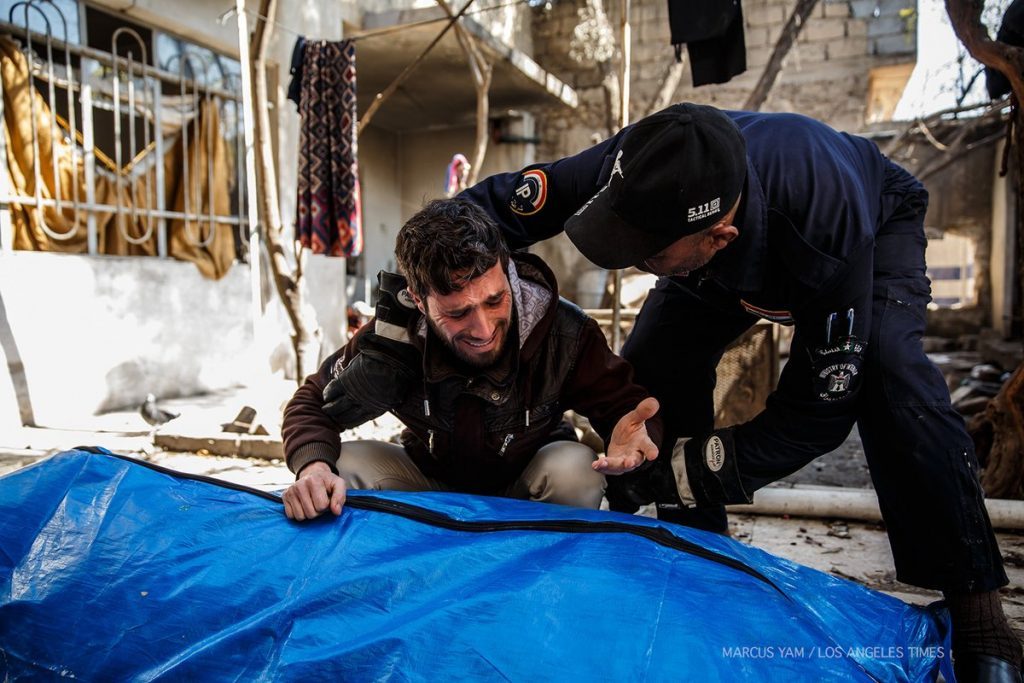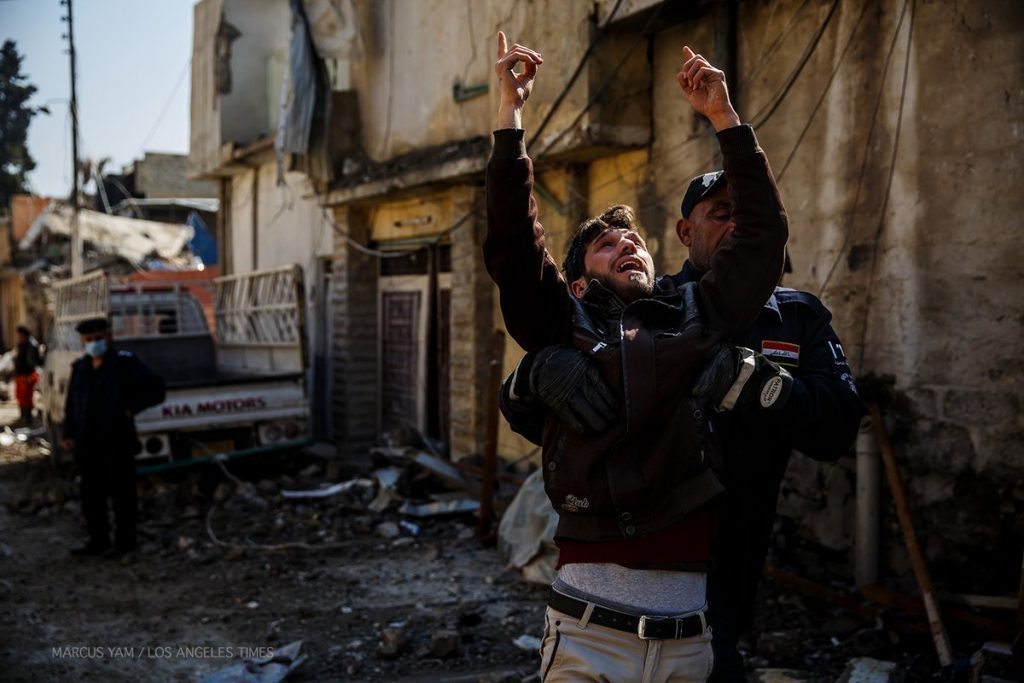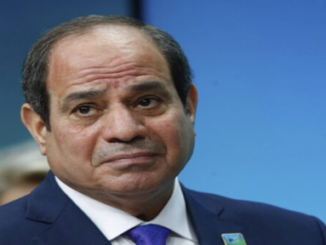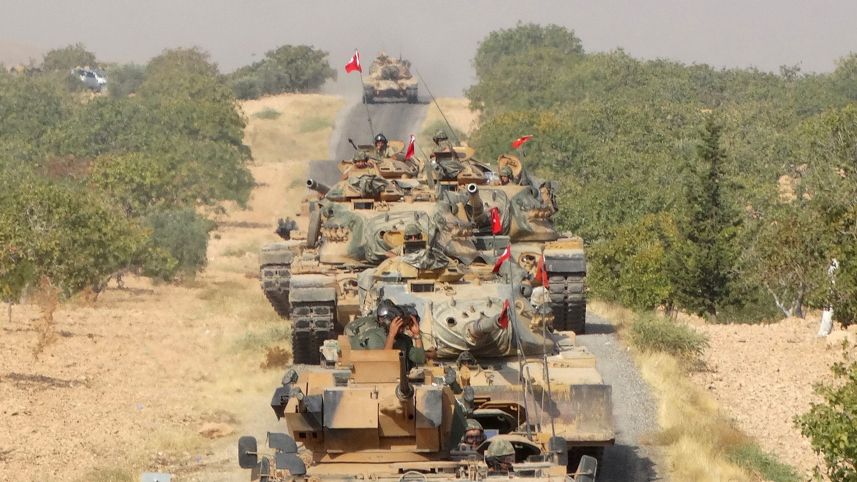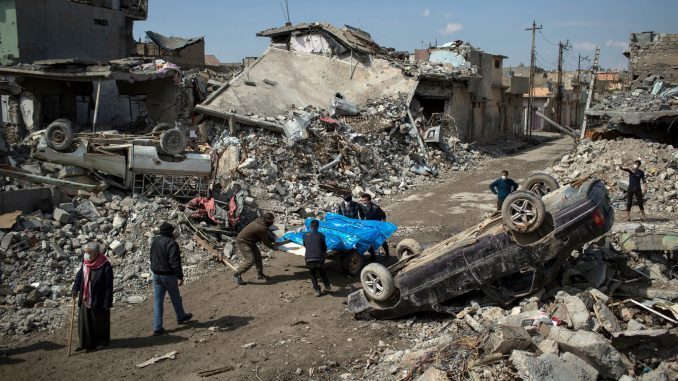
Hundreds of civilians were killed by US-coalition airstrikes against a residential area in Iraq’s Mosul, in a new chapter of the coalition crimes against civilians since Trump took the lead, crimes that have always ready excuses and are forgotten without proper trials.
At the height of its power two years ago, Islamic State ruled over millions of people in territory running from northern Syria through towns and villages along the Tigris and Euphrates river valleys to the outskirts of Baghdad in Iraq.
It was the mosque of Mosul where al-Baghdadi declared his Caliphate and named himself as the ruler of all Muslims from Mosul’s Great Mosque after his forces swept through northern Iraq in 2014.
However, ISIS’s territory is shrinking rapidly since last year as the US-led coalition, the Turkish-backed forces, and the Russian-backed Assad regime forces have fierce fights against its forces in both Syria and Iraq.
The United States is providing air and ground support to Iraqi and Kurdish forces trying to dislodge the hardline group from Mosul.
Iraqi forces captured the eastern side of Mosul in January after 100 days of fighting and launched their attack on the districts that lie west of the Tigris river on Feb. 19.
Islamic State militants who retreated across the Tigris river to western districts also regularly target civilian areas under government control in the east with mortars and grenades dropped from drones.
Several thousand militants, including many who traveled from Western countries to join up, are believed to be in Mosul among a remaining civilian population estimated at the start of the offensive at 750,000.
They are using mortars, sniper fire, booby traps, and suicide car bombs to fight the offensive carried out by a 100,000-strong force made up of Iraqi armed forces, regional Kurdish peshmerga fighters and Iranian-trained Shi’ite paramilitary groups.
More than 200 civilians killed
Approximately 230 residents were buried in collapsed buildings in the Iraqi city of Mosul after an air strike against Islamic State triggered a massive explosion last week.
Iraqi sources said that airstrikes by the U.S.-led coalition targeting Islamic State militants may have detonated a truck filled with explosives, destroying buildings in a heavily populated area.
Local lawmaker Faris al-Sanjari told Reuters the coalition air strike had targeted a truck bomb causing a huge explosion.
“You can’t kill dozens just to destroy a booby-trapped truck parked near houses,” he said.
Civil Defence chief Brigadier Mohammed Al-Jawari told local reporters that rescue teams were retrieving bodies from under the debris in the Mosul Jadida district near Rahma hospital, the site of heavy fighting between Iraqi forces and Islamic State.
Jawari said in a statement saying teams had so far recovered 40 bodies from buildings that collapsed.
“Finding survivors is very difficult because the area is completely destroyed,” he told reporters. “It’s a very big disaster, indeed we can describe it as a disaster.”
On #AJNewsGrid: Hundreds of civilian casualties after #Mosul airstrikes. Share your questions ? https://t.co/BRC9m6PNTo pic.twitter.com/A2k2t3mmHk
— Al Jazeera English (@AJEnglish) March 25, 2017
Sources said more than 137 civilians were killed in the site of the explosion while 100 others were killed nearby as the destruction area was vey large. Bodies were believed to be still buried inside collapsed homes.
“A coalition air strike hit a residential street last Friday and destroyed at least 30 houses,” a police civil defense official said. “We halted rescue operations today for lack of heavy equipment, jack hammers, and trucks to remove debris.”
A resident said on Friday a strike hit a massive Islamic State truck bomb in a residential area, which exploded and destroyed seven homes where dozens of people were hiding.
Another resident said 25 homes were damaged. With fighting still going on, residents have been unable to recover bodies since the strike, the resident said.
Earlier on Saturday, the UN expressed profound concern over the escalating civilian death toll in the battle to retake Mosul.
“We are stunned by this terrible loss of life,” Lise Grande, the humanitarian coordinator for Iraq, said in a statement.
Saw too much to comprehend in the al-Jadida neighborhood of Mosul today. pic.twitter.com/tSJGEgdWlS
— Marcus Yam (@yamphoto) March 25, 2017
Incredibly painful to watch people pull out their loved ones, clutch them, put them in body bags & live to bury them https://t.co/O2G7hahY47 pic.twitter.com/XQIM8jBJtE
— Marcus Yam (@yamphoto) March 25, 2017
Excuses are always ready
If confirmed, the series of airstrikes would rank among the highest civilian death tolls in an American air mission since the United States went to war in Iraq in 2003. And the reports of civilian deaths in Mosul came immediately after two recent incidents in Syria, where the coalition is also battling the Islamic State from the air, in which activists and local residents said dozens of civilians had been killed.
Taken together, the surge of reported civilian deaths raised questions about whether once-strict rules of engagement meant to minimize civilian casualties were being relaxed under the Trump administration, which has vowed to fight the Islamic State more aggressively.
The coalition did not give details on any specific air strike or comment on a Mosul Jadida district operation, and the excuses were always ready as they said investigation are bein conducted.
“We are aware of reports on airstrikes in Mosul resulting in civilian casualties. The Coalition conducted several strikes near Mosul and we will provide this information to our civilian casualty team for further investigation,” the coalition said in a statement.
U.S.-led coalition investigating whether it was responsible for an airstrike in west #Mosul that local officials said killed at least 200. pic.twitter.com/5At0xKLLBZ
— Marcus Yam (@yamphoto) March 25, 2017
Mark Kimmitt, a former US assistant secretary for political and military affairs, told Al Jazeera that while the deaths of civilians were unfortunate, such “incidents happen in combat”.
“Coalition forces are doing everything they can, along with Iraqi security forces, to minimize civilian casualties.
A spokesman for the United States Central Command said that the military was seeking to determine whether the explosion in Mosul might have been prompted by an American or coalition airstrike, or was a bomb or booby trap placed by the Islamic State.
“It’s a complicated question, and we’ve literally had people working nonstop throughout the night to understand it,” Colonel Thomas said in an interview. He said the explosion and the reasons behind it had “gotten attention at the highest level.”
As to who was responsible, he said, “at the moment, the answer is: We don’t know.”
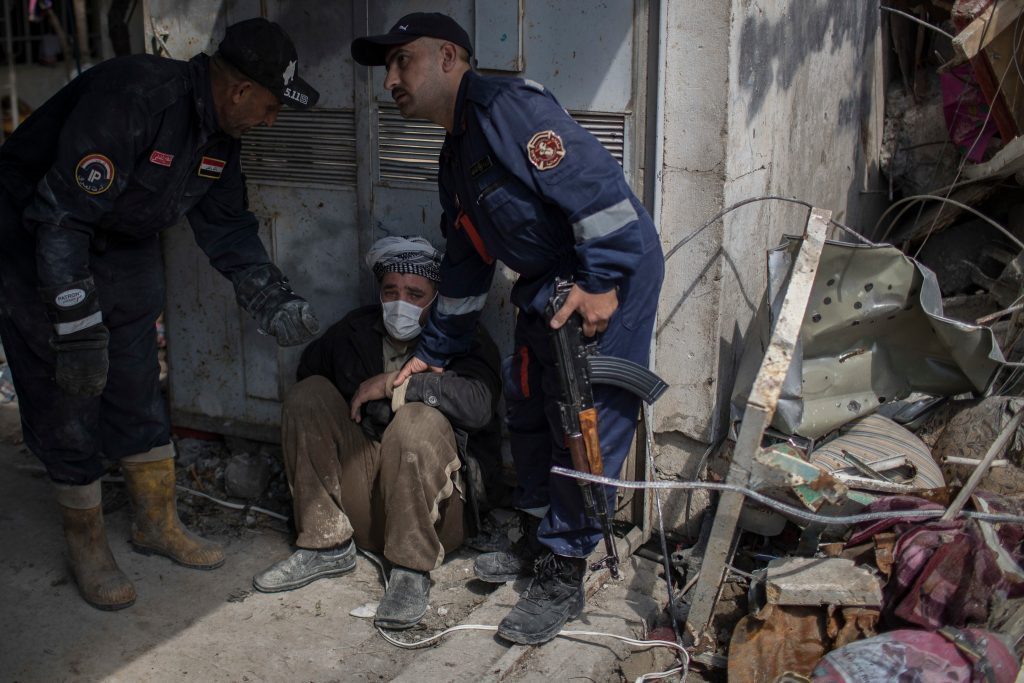
Airstrikes are called more randomly
Before, Iraqi officers were highly critical of the Obama administration’s rules, saying that many requests for airstrikes were denied because of the risk that civilians would be hurt. Now, the officer said, it has become much easier to call in airstrikes.
This is the second time this week that the military has opened an investigation into civilian deaths reported to have been caused by American airstrikes.
On Tuesday, Central Command said it was investigating an American airstrike in Syria on March 16 that officials said killed dozens of “al-Qaeda operatives” at a meeting place that activists and local residents maintain was part of a religious complex.
But the Syrian Observatory for Human Rights said that 49 people had been killed in what the group described as a massacre of civilians
Some American military officials had also chafed at what they viewed as long and onerous White House procedures for approving strikes under the Obama administration. However, Trump has indicated that he is more inclined to delegate authority for launching strikes to the Pentagon and commanders in the field.
Since the first days of his elections campaign, President Trump has said that his top priority is fighting ISIS and ending its presence in the region at all costs, apparently even at the cost of hundreds of innocent civilians lives.
“We cannot let this evil continue. Nor can we let the hateful ideology of radical Islam — its oppression of women, gays, children and non-believers — be allowed to reside or spread within our own countries,” Trump said in an August speech. “We will defeat radical Islamic terrorism, just as we have defeated every threat we have faced in every age before.”
How many were really killed?
The US-led coalition fighting ISIS in Syria and Iraq said earlier this month that its raids had unintentionally killed at least 220 civilians since 2014 in both countries.
Critics say the real number is much higher.
Amnesty International said in October 2016 that the US-led coalition has killed at least 300 civilians in Syria.
“In its backing of anti-Isis ground forces during this summer’s Manbij campaign, the US-led coalition killed some 250 or more civilians, and yet it does not acknowledge them,” said Neil Sammonds, Amnesty’s researcher for Syria.
It is a conservative toll compared with estimates from other monitoring groups, which put the number of deaths from coalition bombing at 600 to 1,000. The monitoring groups include the Syrian Network for Human Rights, the Syrian Observatory for Human Rights and the Violations Documentation Centre.
However, the US administration stick to their story and numbers.
US Central Command, which leaders Operation Inherent Resolve, confirmed 21 civilian deaths in nine new incidents in its latest round of investigations.
“We regret the unintentional loss of civilian lives resulting from coalition efforts to defeat Isis in Iraq and Syria and express our deepest sympathies to the families and others affected by these strikes,” a spokesperson said.
The deadliest single strike was in Mosul on 13 January, where investigators found eight civilians were “unintentionally killed” in an operation targeting Isis fighters in a house.
Anyway, the US administration say that they tke every measure to assure their forces don’t kill civilians by mistake.
“Although the Coalition takes extraordinary efforts to strike military targets in a manner that minimises the risk of civilian casualties, in some incidents casualties are unavoidable,” a spokesperson for said.
“In each of the incidents, the investigation assessed that although all feasible precautions were taken and the decision to strike complied with the Law of Armed Conflict, unintended civilian casualties unfortunately occurred.”
The US administration admitted it was unable to “fully investigate all reports of possible civilian casualties using traditional investigative methods, such as interviewing witnesses and examining the site”, saying it instead interviews pilots, reviews strike footage and analyses information from partner forces, governments, humanitarian groups, traditional and social media.
All confirmed incidents so far were authorised under Barack Obama’s administration, while a similar strategy is expected to continue under Donald Trump.

